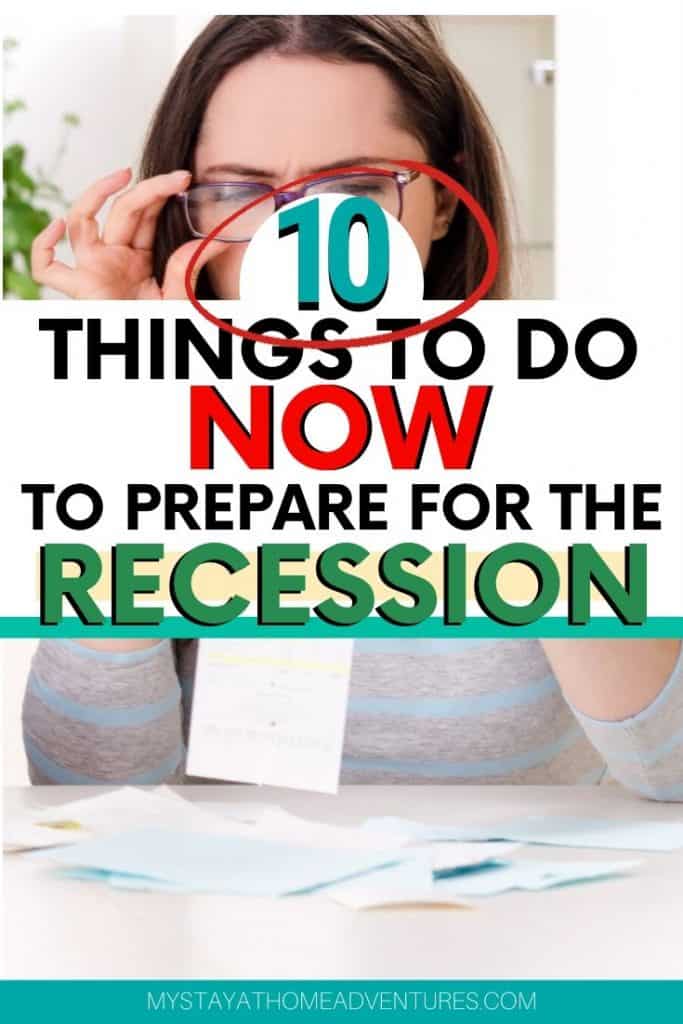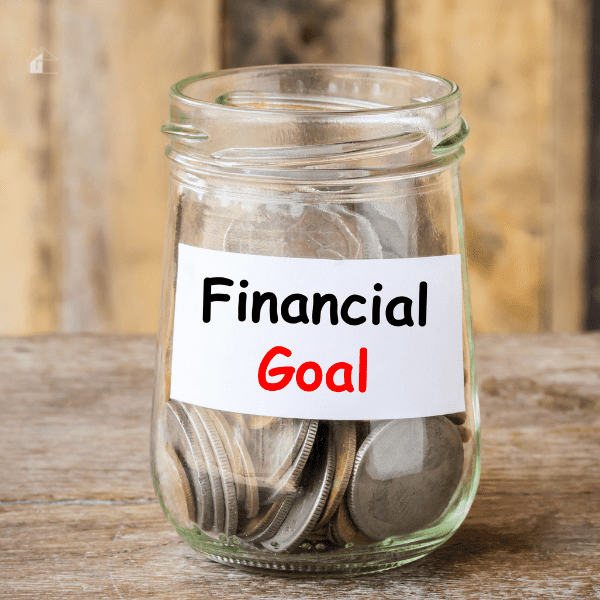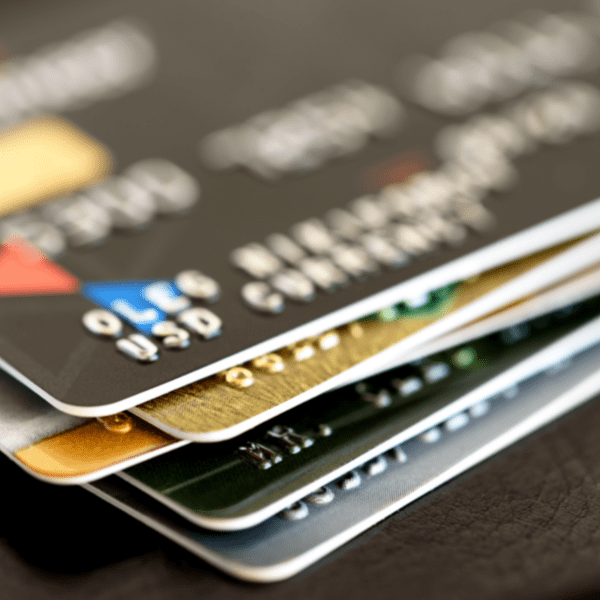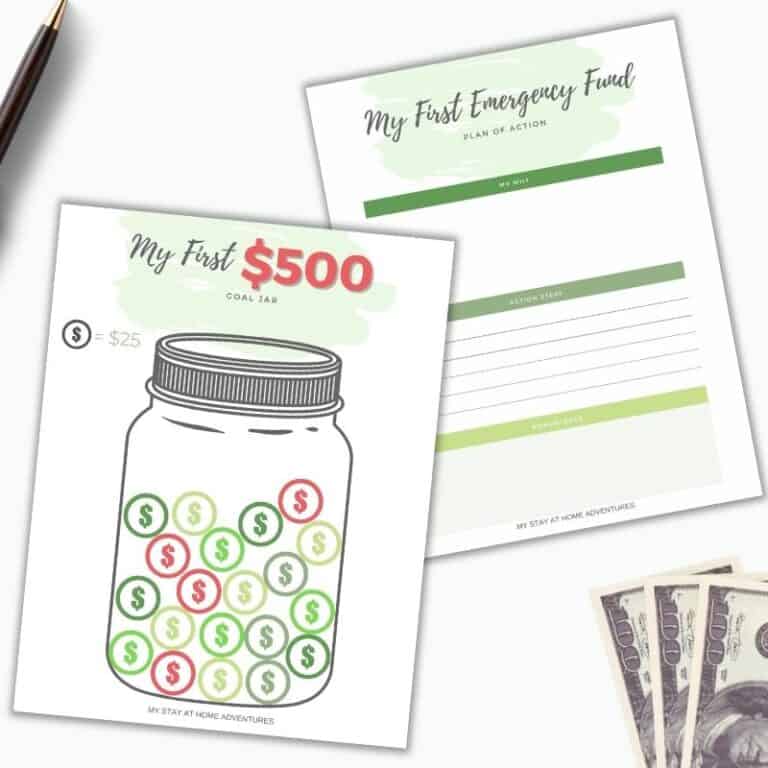How Can We Prepare for a Recession?
This post may contain affiliate links which might earn us money. Please read my Disclosure and Privacy policies hereA recession is inevitable, but there are things everyday people can do right now to save money and get prepared. Here are some tips on how to prepare for the recession
Let's be honest; we never thought that 2020 was going to be the year it turned out to be. But fast forward to now, and it has also affected our economy. Though there are other factors, we can all agree that 2020 was where it started.
We are making drastic changes to our budget and yearly money goals.
Now, I know that there are other ways people are being affected by this situation, and we want to focus on things that we can do now and that we are doing now to save money.
I know many people are asking these questions:
- How can we save in a recession?
- How can we prepare for a recession?
We don't have the answer, but we do know that a recession is investable.

What is a recession?
A recession is a widespread severe decline in wages, customer demands, and employment, and it tends to last for about a year.
What should you do during a recession?
There are a few things you can do during a recession:
- Save your money: It is important to have an emergency fund that can cover your expenses for at least 3-6 months.
- Invest in yourself: A recession is a great time to invest in yourself by taking online courses, learning new skills, or reading books that can help you in your career.
- Find ways to make extra money: If you are looking for ways to make extra money, now is a great time to start a side hustle or look for freelance work.
- Invest for the Long Term: One of the best things you can do during a recession is to continue investing for the long term. This includes investing in stocks, mutual funds, and index funds.
- Embrace Frugal Living: During a recession, it is essential to embrace frugal living. This means cutting back on unnecessary expenses, eating less, and saving where possible.
- Stay positive: It is essential to stay positive during a recession. This is a difficult time for everyone, but remember that it will eventually end.
What should you not do during a recession?
There are a few things you should avoid during a recession:
- Don't withdraw from your retirement account: It is important not to withdraw from your retirement account during a recession. This will only make the situation worse.
- Avoid taking on new debt: Avoid taking on new debt during a recession. This includes credit card debt, student loans, and car loans.
- Don't make any major life changes: It is best to avoid making any significant life changes during a recession. This includes moving to a new house, switching jobs, or starting a family.
What causes a recession?
Many factors can cause a recession, but the most common cause is decreased consumer spending. This can be caused by several things, including a reduction in wages, an increase in taxes, or a rise in interest rates.
What is the difference between a recession and a depression?
A recession is a widespread economic decline that lasts for about a year. A depression is a more severe economic decline lasting several years.
What are the signs of a recession?
There are a few signs that a recession may be coming:
- A decrease in consumer spending: This is often the first sign that a recession is on the horizon.
- An increase in unemployment: As more people lose their jobs, this is a sign that the economy is slowing down.
- A decrease in stock prices: When stock prices start to decline, it often indicates that a recession is ahead.
- An increase in interest rates: This is often a sign that the Federal Reserve is trying to slow down the economy.
What is the history of recessions in the United States?
There have been numerous recessions in the United States over the years, but some of the most notable include:
- The Great Depression: The Great Depression was the most severe economic downturn in history. It began in 1929 and lasted for about a decade.
- The Recession of 1981-1982: This recession was caused by a combination of high-interest rates and high oil prices. It lasted for about 16 months.
- The Recession of 2007-2009: The cause of this recession was created by the housing market crash and the resulting financial crisis. It lasted for about 18 months.
You might enjoy these posts:
How to make it through a recession?
There are many things you can do right now to start saving money. Many of these things we are doing, and others are ideas that might work for you.
Remember, we don't have the same financial situation, but we know how the economy will affect many of us now.
You can make it through a recession and be prepared for it by following these tips:
Frugality should never be out of style!
I am frugal. Frugality is my way of living. Now take the time to start practicing frugality. ALWAYS!
What do we mean by living frugally? We live by living simply and economically. We are not cheap; we are frugal. We love to value our money and make the best of it.
In times like this, it is better to adopt a frugal lifestyle even if things have not economically changed for you. So make sure you are valuing your money and start simplifying your lifestyle.
Remember that what we are experiencing will have a long-term effect on our economy.
- Read – Frugal Living Tips From the Great Depression
- Watch this video – Frugal Living: 5 Changes We Are Making Due to Inflation
Go back to your budgeting goals and plans
Now is the time to go back to your budget and financial goals for this year, see if they are still applicable, and make changes.
Inflation is higher, and things are costing more, and if you have not gone over your budget, you need to.
Due to this current situation, we decided to go back to saving as much as possible and investing until we can. We visit our budget regularly because of price increases.
I have a video showing how we update our budget categories during inflation, and you can watch it by clicking this link.
Spending Freeze
During this time, freeze your spending by only buying and paying for what you and your family need.
These are uncertain times, and every penny must be accounted for. Think about it this way, if the economy recovers, you come out of this with more money saved and a new perspective on your spending habits.
Reduce the cash
The cash envelope system is amazing, and I firmly believe it will help you save money. But due to this economy, we are taking advantage of free money in cash rewards.
Now, this might be for everyone, and if you have credit card debt, I will encourage you to stick to a cash budgeting system.
If you pay your credit cards on time every month, then take advantage of cashback rewards when you use them for gas, groceries, and other spending.
Another great way to use your credit card or debit is the popular use of store pick up and purchasing online.
Store pick-up like Walmart Groceries Pick-Up will help you save time and money, but you can't use cash as they only accept cards.
Meal planning
One way to save money is by meal planning. This can be done by utilizing what you have in your pantry and fridge, making a grocery list based on that, and then only buying what is on the list.
Have your family help you create a weekly meal plan, and if you need an editable meal plan, we offer them at no cost to you in our subscriber library or here.
Use the resources available.
If you are in need, use the resources available to help you and your family during this time. This can be anything from food banks to government assistance programs.
Companies are offering discounts, services, and more to help consumers during this time. TAKE ADVANTAGE OF THEM!
Cable companies are offering free Wi-Fi hotspots; take advantage of this service. Again, free or reduced Wi-Fi for low-income if you qualify to take advantage of this.
Take advantage of free services and local events.
Take advantage of free services or events in your community to save money. During a recession, many local businesses and organizations offer free or reduced-cost events and services to help people save money.
Check your local paper or online community calendar for free or low-cost events happening near you, such as concerts, festivals, farmer's markets, and more.
You can also check with your local Chamber of Commerce or the Council on Aging for more ideas.

Do not panic shop
Please do not panic shop because of fear of what a recession may bring.
When you panic shop, you deplete the resources available to others who may need them and drive up prices due to the demand.
Think about it, if everyone is buying 10x of what they need, then there aren't enough resources for those who need them, and the price of goods will go up due to the demand.
Do not hoard resources; buy only what you need when you need it.
If you are having trouble reducing your spending due to panic shopping, do this:
- Create a shopping list
- Set a stop shopping date
- Shop for at least one week of supplies
- Don't go out until one week has passed.
The problem I'm seeing is that people are just buying and buying and buying with no point in stopping. So if you are doing this, set yourself a date and a plan when you are not going to shop.
I know it is hard to go out and shop because the items you usually buy are out. But believe me, they will restock but buy with a plan.
When you are shopping, PLEASE take advantage of the following:
- Clearance food items
- Rebates apps:
- Ibotta
- Checkout 51
- Shopkick
- Fetch Rewards (use code DK24W to earn 2,000 points)
Even if you are buying online, many of the apps above will credit you. For example, fetch Rewards will scan your emails for online receipts!
Recession-Proof Your Finances
Start by closely examining your budget and finding ways to cut back on unnecessary expenses.
Track your spending for 30 days to better understand where your money is going and where you can cut back.
Once you have a good handle on your spending, start working on building up your emergency fund.
Ideally, you should have 3-6 months of living expenses saved so you can cover your bills if you lose your job or have a significant unexpected expense.
If you don't have an emergency fund, start small by saving $50 from each paycheck until you have a cushion built up.
Another good way to prepare for a recession is to pay down your debt.
If you can, first focus on paying off high-interest debt, such as credit cards.
This will save you money in interest charges and free up more of your monthly income to save or use for other expenses.
Reduce your bills
Now more than ever, it is time to work on getting your bills lowered. Start by reaching out to your service providers and finding better deals, and if you are struggling, then it is time to speak to them about it.
Many companies are willing to work with customers who are facing financial hardship.
You may be able to get a reduction in your monthly payments, an extension on your due date, or even a temporary suspension of service.
It never hurts to ask; you may be surprised at what you can get.
You can also look and see if you can find better deals on car insurance and cell phone providers.
My cellphone provider, Tello Mobile, has plans that start at $5, and you can bring your phone! I made the switch in 2020 and will recommend them to anyone.
You can learn more about Tello by reading this post: The Best Cell Phone Service for Budget-Conscious Consumers.
Here's my advice, if you are going to be home and you have Wi-Fi or live in an area where, for the next 60 days, you will have free access to free Wi-Fi, downgrade your cellphone package, and save money.







2 Comments